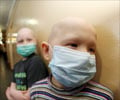China is scrambling to put a swine flu vaccination plan in place, with the number of cases more than tripling in just a few weeks and tens of millions of infections feared as flu season sets in.
China is scrambling to put a swine flu vaccination plan in place, with the number of cases more than tripling in just a few weeks and tens of millions of infections feared as flu season sets in.
The country is at the forefront of international efforts to produce an A(H1N1) influenza vaccine, with at least five companies already receiving government approval, but officials have warned demand will exceed supply.In mid-August, China had recorded 3,103 cases. As of Wednesday, the number had jumped to 10,221, according to the health ministry. No deaths have yet been reported.
Last week, a top ministry official predicted that tens of millions could be infected with the virus in the coming months, leading to "unavoidable" fatalities and possibly putting a severe strain on the nation's health system.
"Vaccination will be a critical line of defence against pandemic A(H1N1) infection" in China, the World Health Organization's Beijing-based spokeswoman Vivian Tan told AFP.
"If the number of more severe cases increases, hospitals and intensive care units could be overwhelmed if they are not well prepared in terms of equipment and trained staff."
After swine flu was first uncovered in the Americas in April, China -- hit hard in the past by bird flu and Severe Acute Respiratory Syndrome (SARS) -- took immediate measures to prevent the new virus from entering the country.
But the virus has now spread to all of China's 31 provinces and regions and 95 percent of the cases are being transmitted domestically, rather than coming via travellers from abroad.
The ministry has said it plans to vaccinate 65 million people, or five percent of the total 1.3 billion population, before year's end. The programme is expected to begin soon, though a precise date has not been announced.
"We've been told that China's immunisation plan is still under discussion and should be finalised in the coming days," Tan said.
"It seems that China is prioritising groups of people for immunisation largely in line with WHO's recommendations, with some adjustments based on national priorities and needs."
Vaccinations are to be voluntary and free of charge, the health ministry said.
Medical workers, border inspection workers and transportation workers would have priority for vaccinations, followed by the military and police and middle, elementary and kindergarten students and teachers, the ministry said.
Those with chronic heart and lung diseases as well as people participating in the festivities to mark the 60th anniversary of the founding of communist China on October 1 will also be given priority.
Shipments of vaccine have so far been distributed to eight provinces including Guangdong, Shandong, Sichuan and Hunan, where outbreaks have been the most severe, state media have reported.
The nation has also stockpiled up to 13 million doses of antiviral drugs -- a supply that would only last 18 days, the People's Daily reported.
Provinces and regions are setting up their own vaccination plans in accordance with health ministry guidelines, reports have said.
The WHO has also called on China to monitor the side-effects of the vaccine and carefully monitor the spread of the disease.
"As more people get infected across the country, there is a risk of the A(H1N1) virus mutating or reassorting with other viruses in humans or animals," Tan said.
"Thus it's crucial to monitor the situation for any possible signs of the virus changing, becoming more severe or drug-resistant."
Source-AFP
LIN
 MEDINDIA
MEDINDIA



 Email
Email






